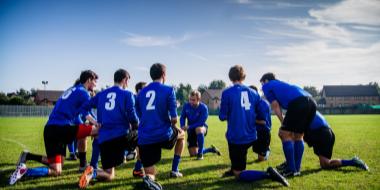Showing Teamwork on Your CV: A Guide to Key Skills
Teamwork is one of the most essential and valuable skills you can bring to the workplace. Most jobs require you to interact with colleagues, collaborating with other employees to achieve common goals. How well you prove your teamwork skills on your CV can go a long way to determining job hunt success. In this article, we’ll discuss how to showcase teamwork skills on your CV for maximum impact with employers.

Teamwork skills: What are they?
Teamwork is simply the ability to work within a group or team of individuals. This describes most jobs, where employees work for an organisation, alongside colleagues, to contribute towards success for that organisation. It can be easy to take teamwork skills for granted because almost every employee who works for an organisation will need to have them. However, if you’ve ever worked in a team with people who lack teamwork skills, you’ll know about it.
Teamwork skills cover not only your ability to get along with colleagues, but also various other essential workplace personal skills and strengths that can help to make you a valuable and respected employee and colleague. If you can show these skills on your CV and cover letter, in addition to the key technical skills required for the role, you’ll give yourself a strong chance of progressing to the next stage of the recruitment process.
The Role of Teamwork Skills in the Job Market
It’s crucial to demonstrate your teamwork skills on your CV, as they will show employers how well you’re likely to fit into their team, and how successful you’ll be in the role. It’s not enough, however, to simply list ‘teamwork’ in your skills section. You’ll need to show examples of your teamwork qualities throughout your CV. Do this by referencing your career achievements and explaining how your teamwork skills contributed to that success.
You’re likely to find a requirement for teamwork in almost every job advert you read. Unless you’re working in isolation or for yourself, teamwork is one of the fundamental elements of most roles. Any job where you have colleagues or where you form part of a wider team relies on teamwork so that everyone can achieve success. Here are some examples of how teamwork contributes to just a few different roles and industries:
- Marketing: the marketing and advertising industries require a team of specialists to work together to devise, develop and deliver campaigns, either for clients or for in-house marketing departments.
- Finance: while finance and banking roles rely on individual skills and specialisms, these need to come together as part of a wider team to deliver profit for the organisation.
- Health: the healthcare sector brings professionals from a wide range of backgrounds together, to work towards shared goals of fitter, healthier populations.
- Education: teachers may face a classroom of pupils alone, but they work together with other teachers, administrators and management to make educational institutions function and perform to a high level.
- Logistics: sectors such as warehousing, wholesale and various types of shipping all require highly functional teams to deliver an efficient service at all times.
- Human resources: HR teams bring together colleagues with different specialisms and skills to create a support service for organisations, covering everything from payroll and recruitment to training, health and safety, planning and employee relations and wellbeing.
Expert Tip:
Showing you work well in a team is an essential requirement for any CV. Use every section of your CV to demonstrate that you can thrive in a team environment and settle well into a new role, using evidence from successful projects and collective achievements throughout your career.
How and Where to Add Teamwork Skills in Your CV
It’s important to spread examples of teamwork skills throughout your CV and cover letter. Mentioning teamwork and other team-related skills in a simple list won’t cut it with most employers. Hiring managers will want to see evidence and examples of using these skills to positive effect in your career. You can mention teamwork skills in almost any area of your CV:
CV summary
If teamwork and it’s related skills are one of your strongest qualities, or if it’s particularly prominent in the job description, you can mention it at the outset of your CV in the summary or CV objective. Highlight one or two key skills related to teamwork, to emphasise your commitment to working in a team, and the success it’s brought you. For example:
Team-oriented project manager with a track record of collaborating on successful digital marketing campaigns. A strong communicator with a flexible approach and a commitment to working towards shared goals and values.
Work experience
Your CV work experience section is the ideal place to show evidence of your teamwork skills. If you’re using reverse-chronological CV templates, there’s plenty of space in this section to expand upon your skills and qualities, and how they’ve contributed towards success. Use teamwork-focused keywords and strong action verbs to highlight your skills in this area. Take a look at these CV examples for inspiration:
Coordinated a team of six HR executives to develop a new corporate strategy on recruitment and training, improving retention rates by 18%.
Partnered with colleagues in research, UX development and project management to design and build a new responsive web app for a major client, a contract worth £900,000 plus repeat business.
Education
If you completed any joint projects or presentations while studying, this can be a great example of your teamwork skills. Mentioning teamwork in your education section is ideal if you’re applying for junior roles or if you don’t have much work experience. Add bullet points under your qualifications, showing examples of your teamwork skills, for example:
Collaborated with classmates to produce a presentation on the impact of misinformation on global politics and elections, winning silver in the 2018 Debating Society Annual Competition
Skills
Your CV skills section provides an opportunity to list any key skills related to teamwork. It’s usually best to avoid mentioning teamwork directly, unless this is specified as a key skill in the job description. You might choose to present your skills under separate lists, such as hard skills, soft skills and computer skills. Teamwork tends to fit best under soft skills.
Optional sections
If you have relevant experience in volunteer roles or working in a team as part of a hobby or leisure activity, it might be worth mentioning these in your CV. These can be particularly useful if teamwork skills are highlighted in the job description as important or essential for the role.
Cover letter
The strongest cover letter examples expand on skills showcased in the CV, picking out key points that you really want the employer to notice. Your cover letter is an ideal place to shine a light on your teamwork skills. Use cover letter templates that give you space to elaborate on some of your key qualities, and choose one or two key teamwork skills or qualities to focus on. Provide a brief outline of how those teamwork skills have contributed to success in your career to date.
The Role of Teamwork in a Successful Career
Career success is rarely achieved in total isolation. Progression and promotion in your job usually rely on the consistent achievement and surpassing of collective goals. Your contribution to wider objectives plays a major role in determining whether you’ll receive recognition from managers and colleagues.
Studies indicate that teamwork has a consistent positive influence on organisational performance (1). This means that when employees feel a sense of commitment and responsibility towards their colleagues and an organisation, they tend to perform better in their job. This is great news for career development, as it means that strong teamwork skills are likely to lead to better collective outcomes. And when a team performs well, the individuals in that team are likely to be rewarded.
As your career progresses, teamwork skills won’t become less important, but the nature of the skills you’ll need will shift. Employers will expect you to start showing leadership skills within your teams, and hope to see you take responsibility for delivering results, rather than just contributing towards team success. This is something to bear in mind as you draft your CV and identify the teamwork skills to focus on.
"You’ll need to show examples of your teamwork qualities throughout your CV. Do this by referencing your career achievements and explaining how your teamwork skills contributed to that success."
List of Teamwork-related skills
Rather than adding ‘teamwork skills’ in your CV, there are various other skills and CV keywords that you can use to show you work effectively in a team environment. Take a look at these different types of teamwork skills for your CV:
- Communication
- Interpersonal skills
- Flexibility
- Open-mindedness
- Collaboration
- Problem-solving
- Conflict resolution
- Accountability
- Reliability
- Listening skills
- Organisation
- Leadership skills
Key Takeaways for Adding Teamwork to Your CV
Demonstrating teamwork skills in your CV isn’t really optional. Most employers will want to see evidence that you work well in a team environment. Add different skills related to team working throughout your CV, and show your teamwork skills in your achievements and career milestones. You can showcase your teamwork skills best with a professional CV design from Jobseeker. Sign up today to create a CV that makes a strong impression, and find plenty more resources, including CV articles. You can also find useful cover letter articles, resources and templates.
Sources:
(1) Harvard Business Review: When Teamwork Is Good for Employees — and When It Isn’t



